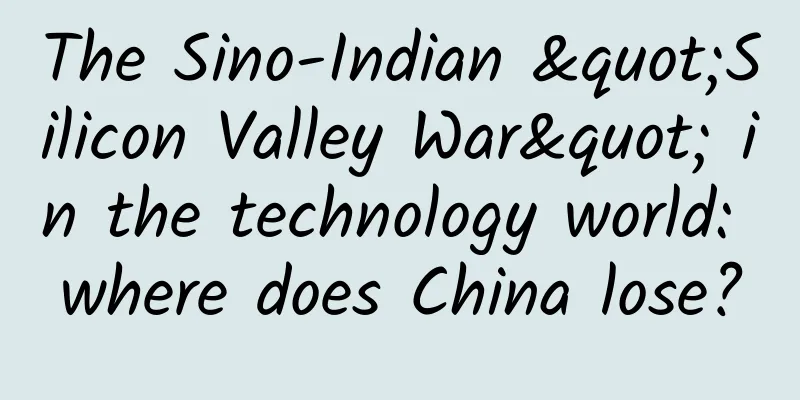The Sino-Indian "Silicon Valley War" in the technology world: where does China lose?

|
Silicon Star News Recently, the most eye-catching thing in the United States is the successive visits of the leaders of China and India to the United States. First, on September 22, President Xi visited the United States, and the top technology companies represented by Jack Ma, Pony Ma and Robin Li collectively appeared in Seattle, becoming the focus of foreign media attention. Later, Indian Prime Minister Modi visited Silicon Valley. Although he was not accompanied by the majestic "boss group", the executives of the technology giants he met in Silicon Valley were all "individuals" - Google CEO Sundar Pichai, Microsoft CEO Satya Nadella and Adobe CEO Shantanu Narayen, all of whom were born and raised in India and then immigrated to the United States. In fact, as the most representative ethnic groups of technical immigrants in the United States, India and China have always had a large gap in influence and comprehensive strength: Indians not only occupy seats in the C-level leadership of major Silicon Valley technology giants (executives whose positions begin with C "chief, ***" and end with O "officer") and control the development direction of giant companies, but they have also formed an end-to-end industrial chain in the field of entrepreneurship - many B2B startups in India are invested by Indian VCs, and form strategic partnerships with IT companies controlled by Indians to boost the startups, and are even eventually acquired by IT companies controlled by Indians to exit. In comparison, the influence of Chinese in the Silicon Valley technology community is much inferior. And this gap is widening year by year with the appointment of many Indian CEOs in Silicon Valley. The gap in power between China and India in the US widens At present, the comprehensive strength of India and China is exactly the opposite in their home countries and Silicon Valley. In their home countries, India's national strength is not as strong as China's, while in Silicon Valley, the power of Indian immigrants not only penetrates into major technology companies, but also occupies important seats in management and leadership.
In terms of national strength, the gap between China and India is widening. China has become the world's second largest economy, while India's economy has always been restricted by language, system and infrastructure. When China's Internet leaders represented by Baidu, Alibaba and JD.com were listed on the Nasdaq in the United States, India's technology industry was still dominated by IT services and outsourcing services. However, in Silicon Valley, the power of Indian immigrants is increasing, while the power of Chinese has not changed significantly. Although the number of Chinese in California is increasing and they are spread all over major technology companies, the glass ceiling still exists, and there are very few leaders working at the C-level of the company. Even for companies founded by themselves, leaders often tend to hire CEOs from outside and serve as CTOs themselves, focusing on product and technology research and development. On the other hand, India seems to be more suitable for this soil and is quite like a fish in water. Not only are there many Indian executives, but the current heads of Google, Microsoft and Adobe are all technical immigrants who were born and raised in India, and they are also very active in technological innovation. According to statistics from the Kauffman Foundation, between 2006 and 2012, for every 10 startups in Silicon Valley, about 4 of the company's founders or co-founders were immigrants. Among the companies founded by these immigrants, one-third were initiated by Indians. Where exactly did China lose? So, where did we lose? To this end, the reporter interviewed the representative leader of the "Tsinghua School" in Silicon Valley, Eugene Zhang, the founding partner of the Tsinghua Entrepreneurs Association Angel Fund (TEEC Angel Fund), who used his own personal experience to analyze the profound reasons behind the disparity in power between China and India in Silicon Valley. First, the language advantage is insufficient and the culture is not grounded. In terms of language, English is the official language of India. Although the dialects in India vary greatly and it is almost impossible to communicate in the native language, English is the most commonly used tool for communication. We often laugh at Indians saying that English is "curry-flavored", but they have no problem expressing their ideas in English. However, English communication is a challenge for Chinese people. Chinese and English belong to different language families, and their grammatical structures and expression habits are very different. In addition, the exam-oriented education focuses on reading and writing, but not listening and speaking, so the foundation of English communication is not solid. Most of the Chinese who come to Silicon Valley have technical backgrounds such as engineering and programming. This group has a commonality: they are logical, pragmatic, meticulous about technical issues, but taciturn. English is not their strong point, which makes them more inclined to delve into technical issues and communicate less, so their English is not practiced. Secondly, in terms of culture, when facing Western culture, many people are quite at a loss, or even strongly resist it. Zhang Yuqing gave an example of a friend of his who went to work at Cisco when he just graduated. The first question he asked was "Is this allowed?" At that time, his supervisor paused for a long time, not knowing how to answer this question that had never been asked before. The Chinese habitual way of thinking is: Is this allowed? Does my superior agree with me doing this? However, the culture of most Silicon Valley technology companies advocates a free and relaxed working environment and adopts a flat management style. Although everyone has different positions, the relationship between superiors and subordinates is weakened. The supervisor wants to hear employees say to themselves: I have such an idea, what do you think? I want to implement this plan, but I don’t have enough resources now. Can you give me some help? From passive to active, from obedient to leading, it is a big psychological leap for Chinese people. In contrast, Indians are more proactive in expressing their opinions and fighting for resources, and they also know when to strike. This is not only due to their language advantage, but also due to their cultural adaptability. Again, strong professional ability, but insufficient management awareness In Silicon Valley, whether Chinese or Indian, most people come from a technical background. But you can choose two different career paths. One is a purely technical route, to be a senior engineer with strong technical capabilities. For example, Google has more than a dozen levels for engineers. The other is to work in technology first and then move on to management positions, such as product managers or product marketing managers. These management positions require not only deep technical skills, but also commercial sensitivity to market trends and industrial environments, and most importantly, communication and management skills. Zhang Yuqing told reporters that many Chinese people are immersed in technology, thinking that as long as they are good at technology, they can be appreciated by their bosses and get promotion and salary increase in the near future. However, the actual situation is not so. In Silicon Valley, where there are many technical talents, soft power is more important than hard power. Whether you can cooperate well with your teammates and whether you can manage your subordinates well are important criteria. Supervisors want to promote those with strong soft power, because the higher the level, the more "less technology and more management" the tasks they undertake. How to give full play to the effectiveness of each member of the team is the most concerned issue of management. However, many Chinese people do not pay attention to the cultivation of their own management ability, and sneer at the social skills of Indians in the company, thinking that they are "using connections" and "pleasing superiors". This prejudice and mentality also makes many capable Chinese people stay in technical positions without room for advancement. ***, there are many societies and their power is dispersed From career advancement to entrepreneurship, it is well known that Chinese people are not as good at sticking together as Indians. This can be seen from the scattered Chinese organizations in Silicon Valley. Recently, reporters found that hundreds of large and small Chinese entrepreneurial organizations, associations and societies have emerged in Silicon Valley. Not only are there industry segments, but also school segments. For a time, everyone’s WeChat has joined countless similar societies. Zhang Yuqing told reporters that compared with the dazzling entrepreneurial community organizations in China, he has known only one Indian entrepreneurial community for so many years, that is TiE, the full name of which is The Indian Entreprenuer. This association has many branches and is already a global organization. Founded in Silicon Valley in 1992, it now has more than 13,000 members, all of whom are industry elites and successful entrepreneurs. This association has made a significant contribution to the end-to-end industrial chain formed in India in the field of entrepreneurship. Indian entrepreneurs can rely on this platform to find VC investment in India, and then be acquired or form a strategic partnership with IT companies controlled by India, helping entrepreneurial companies to transform from the idea level to rapid growth. Although there are many Chinese communities, their strength is relatively scattered, and resources have not been integrated and utilized to the highest degree. Not willing to fall behind, they are mobilizing their forces to catch up with India The Chinese in Silicon Valley are aware of the current power disparity between China and India. Especially when Google founder Page announced the establishment of Alphabet and Pichai became the new CEO of Google, the Chinese were reflecting on why they couldn't also produce a few C-level executives. At present, many Chinese have begun to take action, and the most representative of them are the engineers of the "Tsinghua system" with the largest number of people in Silicon Valley. At present, there are more than 10,000 Tsinghua graduates in Silicon Valley. They are either the backbone of major IT companies or entrepreneurs eager to try. They gradually realized the importance of banding together for warmth, so they established the Tsinghua Entrepreneurs Association TEEC and its angel fund TEEC Angel Fund as a base camp and important position for Chinese to gather and share resources and help each other. In terms of career advancement, the association takes the lead in advocating the promotion and use of more young Chinese people. The association brings together senior executives of major Silicon Valley companies from Tsinghua University. They have been practicing and consciously cultivating successors to give more young and potential Chinese people the opportunity to be promoted. Zhang Yuqing told reporters that when they came to the United States, there were not many Chinese people. They took many detours and made many mistakes before they got to management positions. They want to pass on these experiences to the young generation who have just joined the company or started a business, so that young people can take fewer detours. They also hope that more Chinese people can become senior managers of large companies in the near future. Let the older generation of Chinese pass on their experiences, form a solid ethnic bond, and let the Chinese continue to thrive in the Silicon Valley technology community. "We believe that in the near future, more Chinese people will be able to serve as senior managers in important IT companies in Silicon Valley and break the glass ceiling. This requires the efforts of each of us," said Zhang Yuqing. |
<<: Remember, visual design is more than just “looking good”
>>: A shot in the arm for your code — dependency injection
Recommend
Progress bar example ProgressDialog in Android
Progress bar is used to show the progress of a ta...
When doing activities, you must make clear these 3 points
Through the collation and analysis over the past ...
Quantum mechanics hidden in a tiny window? So I advise you to close the curtains at night!
With the continuous development of urbanization, ...
6 Success Principles of KOL Marketing for New Consumer Brands
The collective rise of a number of new consumer b...
Apple Pay enters China: UnionPay’s first step in turning around mobile payments
[[129850]] The red envelope war during the Spring...
Do we need a new theory of evolution?
© The Guardian Leviathan Press: When an explanati...
A universal event planning solution
There is actually no shortcut to planning an even...
How to do “contrast” marketing for products? Here are 4 operational tips for you!
There is a very interesting phenomenon: When it c...
From novice to expert, teach you how to quickly play Sina Fuyi Advertising
When doing information flow advertising , after c...
Analyzing the 4 ways to use Douyin to promote accounts!
What is a Douyin account? A Douyin account that i...
How to layout the information flow landing page? 3 tips to help you retain customers~~
In an information flow advertisement , the role o...
From 0 to 20 billion in just 3 years, all his marketing tricks are here!
"April 23" World Book Day has not yet a...
Breaking the Flattery Growth Camp 01
Resource introduction of Breaking the Flattery Gr...
Detailed explanation of how to increase traffic and followers on Xiaohongshu
How does Xiaohongshu increase followers and make ...









